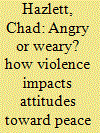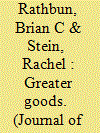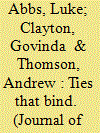| Srl | Item |
| 1 |
ID:
172328


|
|
|
|
|
| Summary/Abstract |
Does exposure to violence motivate individuals to support further violence or to seek peace? Such questions are central to our understanding of how conflicts evolve, terminate, and recur. Yet, convincing empirical evidence as to which response dominates—even in a specific case—has been elusive, owing to the inability to rule out confounding biases. This article employs a natural experiment based on the indiscriminacy of violence within villages in Darfur to examine how refugees’ experiences of violence affect their attitudes toward peace. The results are consistent with a pro-peace or “weary” response: individuals directly harmed by violence were more likely to report that peace is possible and less likely to demand execution of their enemies. This provides microlevel evidence supporting earlier country-level work on “war-weariness” and extends the growing literature on the effects of violence on individuals by including attitudes toward peace as an important outcome. These findings suggest that victims harmed by violence during war can play a positive role in settlement and reconciliation processes.
|
|
|
|
|
|
|
|
|
|
|
|
|
|
|
|
| 2 |
ID:
172329


|
|
|
|
|
| Summary/Abstract |
How does diffusion of civil war battles influence conflict termination? Recent advances in civil war literature have found that battle dynamics shape conflict termination by affecting the intra-conflict bargaining between disputants. This article extends the theoretical perspective and argues that how battles diffuse matters in determining conflict termination. While battlefield dynamics should in principle reveal previously unavailable private information, the relevance of information-revealing effect depends on the diffusion patterns of battles. The persistent, and possibly battle-exacerbated, commitment problem can also alter the prospects of conflict termination. We test the argument by distinguishing two distinct diffusion patterns of battles: distant and proximate. The empirical results reveal that distant diffusion, but not proximate diffusion, of battles makes civil conflicts less likely to terminate. The analysis also demonstrates that incorporating diffusion dynamics significantly improves our ability to predict conflict termination.
|
|
|
|
|
|
|
|
|
|
|
|
|
|
|
|
| 3 |
ID:
172326


|
|
|
|
|
| Summary/Abstract |
Recent research into the public’s attitude toward the use of nuclear weapons repeats long-standing mistakes in how international relations theorists think about morality. Falsely equating consequentialism with state egoism and normative obligations with restrictions on the use of weapons of mass destruction implies that ethically motivated beliefs about foreign affairs must be other-regarding and that other-regarding behavior is not utilitarian in character. Drawing on empirical research into moral psychology, we argue that liberal, other-regarding morality is only one kind of ethical foundation. Alternative moral concerns such as retribution, deference to authority, and in-group loyalty also help to determine foreign policy beliefs. We find that all three are associated with support for the use of nuclear weapons in the American public. Our survey respondents act as moral utilitarians who weigh different ethical considerations in forming their judgments.
|
|
|
|
|
|
|
|
|
|
|
|
|
|
|
|
| 4 |
ID:
172327


|
|
|
|
|
| Summary/Abstract |
This article examines whether refugees are prime candidates for recruitment into armed groups and whether humanitarian aid to refugees impacts their choice to join armed groups. First, our original survey data of 1,358 Syrian households in Lebanon provide evidence that mobilization among the refugee population is low at baseline—the first empirical estimates of the magnitude of the rate of Syrian refugees returning home to fight. Second, leveraging as-if random assignment around a strict altitude cutoff for a United Nations cash transfer program for Syrian refugees, we find little evidence that the aid program had a large effect on mobilization. If anything, our estimates indicate a small decrease in mobilization. Our results stand in contrast to published literature arguing that refugees are prime candidates to join armed groups and humanitarian aid to refugees may support armed groups and fuel recruitment.
|
|
|
|
|
|
|
|
|
|
|
|
|
|
|
|
| 5 |
ID:
172331


|
|
|
|
|
| Summary/Abstract |
It is a central assumption of our research that threats to a fragile security and violence can continue during postconflict peacebuilding and that these threats are driven by many of the same sociopolitical dynamics that initially led to war. We examine a critical but much less queried area of postwar societal instability—violence directed at segments of the population who may still be targets for those seeking dominance. Using a survey of 300 individuals who testified before the International Criminal Tribunal for the Former Yugoslavia (ICTY), we seek to explain violence, threats of violence, and other forms of intimidation directed at those who witnessed human rights violations during the wars in the former Yugoslavia. Our theory of postwar violence emphasizes the vulnerability of the (potential) victims of postwar violence. We argue that victims are selectively chosen because of their vulnerability. We develop and test an alternative explanation for this selective targeting that emphasizes the level of exposure an individual may have because of testifying at the ICTY. The results demonstrate quite convincingly, however, that it is vulnerability rather than exposure risk that predicts who is most likely to be targeted with human security threats.
|
|
|
|
|
|
|
|
|
|
|
|
|
|
|
|
| 6 |
ID:
172330


|
|
|
|
|
| Summary/Abstract |
Existing research reveals many of the ways pro-government militia (PGM) shape civil violence but overlooks how the ethno-political ties between the state and a PGM might influence these effects. We argue that co-ethnic militia (i.e., groups composed of the ruling elite’s ethnic kin) are relatively loyal irregular forces that multiply state military capacity. The greater loyalty of co-ethnic groups mitigates principal–agent problems but further polarizes ethnic communities, and as a result, co-ethnic PGMs are likely to be associated with longer and more intense civil conflict. We test this argument on a global sample of cases from 1989 to 2007 using new data capturing the ethnic ties of all PGMs. The results support our claims that co-ethnic militia are associated with more intense and longer civil conflict.
|
|
|
|
|
|
|
|
|
|
|
|
|
|
|
|